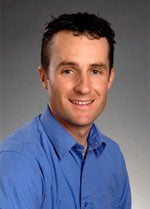
Tyler Johnson, associate professor and director of the Master of Athletic Leadership Graduate Program in the Department of Kinesiology, along with Lindsey Turner, research associate professor in the College of Education, published a research paper in the high-ranked journal, Research Quarterly for Exercise and Sport.
The paper, published in the December issue of the journal, is titled “Physical Activity Practices in Elementary Schools and Associations with Physical Education Staffing and Training” and the abstract is available on the National Library of Medicine.
Johnson and Turner used data from nearly 2,000 U.S. public elementary schools that Turner collected as part of the Bridging the Gap research project at the University of Illinois. Schools were surveyed during the 2009-10 to 2011-12 school years and survey respondents provided information on school physical activity policies and practices.
The researchers found that very few schools followed recommendations to provide comprehensive physical activity programming, that is physical education class, recess and other opportunities for movement during the day such as activity breaks and after-school sports.
However, following best-practices for physical education and physical activity was more common where a trained physical education professional was employed full-time at the school, and was required to receive continuing education on physical education.
The results provide support for a recent movement among physical education and public health organizations, emphasizing the value of school physical education professionals in assuming a leadership role to promote comprehensive physical activity programming. These organizations also emphasize the need for school physical activity leaders to be provided the financial resources necessary to implement this key element of school health.
Organizations such as the Centers for Disease Control and Prevention, SHAPE America (formerly the American Alliance for Health, Physical Education, Recreation and Dance), and the Alliance for a Healthier Generation, have emphasized the importance of comprehensive physical activity programming for promoting students’ physical and emotional health and development, as well as academic outcomes.
The paper was co-authored with Turner’s former colleagues and continuing collaborators Frank Chaloupka and Sandy Slater, who are both at the Health Policy Center at the University of Illinois at Chicago.